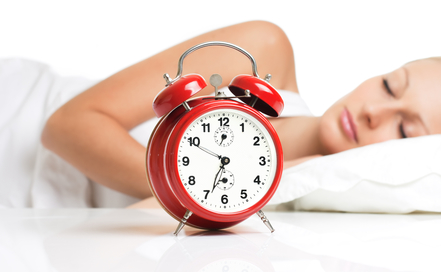| |
|


IN THIS ISSUE |
|
Don't let the holiday affect your healthy figure, learn how to prevent that extra holiday weight. Learn how sleep can be your pain relief option. |
Have a question, comment, or concern? Want to read an editorial response about a personal health concern? Email: |
| Last Month | |
| This Month | |
Don't Gain Extra Holiday Weight |
|
|
Why do we give in so easily to holiday foods? Yes, those special candies and pies are especially tempting, but there’s more to it than that. It turns out that one key aspect of overeating - at any time of year - is based on your emotional state before and during the meal. Studies have indicated that for most people, overeating behaviors are more likely to be based on emotional cues than the specifics of the food itself. And what’s more emotional than the holidays? Whether your particular family experience is joyful or frightful, the end result may be overindulgence triggered by emotions. The strong connection between emotional experience and eating seems to be based partly in the repetitive nature of the behavior. Think of how many thousands of times you've eaten a meal, snack, or treat during your lifetime. Now consider how many of those events are likely to be associated in your memory with a particular emotion, such as sadness, due to the events surrounding the experience of eating. Psychologists refer to these repeated connective experiences as conditioning. Given the special nature of some holiday foods, which are reserved only for this time of year (think fruitcake), it's not surprising that sad memories or old feelings of anger might be deeply connected with overeating behaviors. Given the pressures of shopping, family dynamics, and fatigue, overeating during the holidays is practically normal. But you can change those overeating traditions. To keep the holiday pounds (and those guilty feelings) away, you just need to employ a few helpful strategies.
|
|
Healthy Pain Relief Method |
|
|
Sleep-deprived holiday-makers Most interviewed people admitted that they do not get enough sleep during the holidays. The most affected are the parents. About 44 percents moms and dads said that the reason for the lack of sleep is their worry that they will not be able to fulfill their kids’ wishes and expectations. They simply cannot afford the cost the holidays entail. But, parents are not the only ones suffering. People without kids said that they cannot sleep during holidays out of pure stress, caused by the traditional holiday chaos and frenzy. Even people who enjoy holidays and find the season joyful and fun said that they do not get enough sleep. There is simply too much to do: trees to decorate, stockings to fill, cakes to bake, gifts to wrap, Christmas cards to write… We need sleep In our efforts to fill our lives with all the things we want to do, we often sacrifice sleep, without realizing how serious lack of sleep can be. Doctors and sleep experts warn that we need at least eight hours of good, uninterrupted sleep for optimal health. There are many activities that happen within our body and our brain while we are asleep. The most obvious is that during sleep we rest and regain energy. But, many other actions happen during sleep, and only during sleep, such as tissue repair, muscle growth, protein synthesis, and the release of growth hormone. Sleep is linked to changes in the brain's organization and structure. During sleep, our brain sorts our daily events and forms long-term memories. Lack of sleep affects our ability to learn and retain what we have learned. Sleep and pain While scientists admit that they still have a lot to learn about the effect of sleep to our health, the latest research found a link between the amount of sleep we get and our ability to sustain pain. A group of scientists worked with a small group of 18 adults. Half of them spent four days sleeping about 10 hours, and the other half were allowed to sleep their usual time. On average, it was about 7 hours. After a short time, researchers found that the participants who slept longer had 25 percent less sensitivity to pain. This is the first study of its kind and the researchers are cautious to draw conclusions about the potential their results will have on pain control and management. Nevertheless, what they have learned opens avenues for more research on using sleep to prepare people for surgery and treating all kinds of chronic pain, including chronic pain syndrome. If you are one of those lucky people who spend eight or nine hours every night sleeping the sleep of the innocent, you know the feeling of waking up full of energy, alert and ready to face the day. If you prefer to spend your nights playing computer games or watching TV, you might be risking your long-term health, short-term energy level and ability to learn. Stop burning the candle at both ends and get some sleep!
|
|
 |
|
 It's no wonder that we tend to eat too much during the holiday season. It may be a time of good will, togetherness, and celebration, but let's face it: the holidays are also a time of increased stress. That stressed-out feeling all too often leads us to finding comfort in food - and holiday food is far more tempting than usual, with all of its starches, buttery sauces, and sugar.
It's no wonder that we tend to eat too much during the holiday season. It may be a time of good will, togetherness, and celebration, but let's face it: the holidays are also a time of increased stress. That stressed-out feeling all too often leads us to finding comfort in food - and holiday food is far more tempting than usual, with all of its starches, buttery sauces, and sugar.  Santa gets all sorts of funny wishes, but one of the strangest is the one that comes from about six percent of Americans: they wish for more sleep. The latest year-end Holiday Slumber Index, a traditional survey conducted by the sleepbetter.org, examined how the holiday season affects American adults' sleep patterns. They came up with some interesting results.
Santa gets all sorts of funny wishes, but one of the strangest is the one that comes from about six percent of Americans: they wish for more sleep. The latest year-end Holiday Slumber Index, a traditional survey conducted by the sleepbetter.org, examined how the holiday season affects American adults' sleep patterns. They came up with some interesting results.